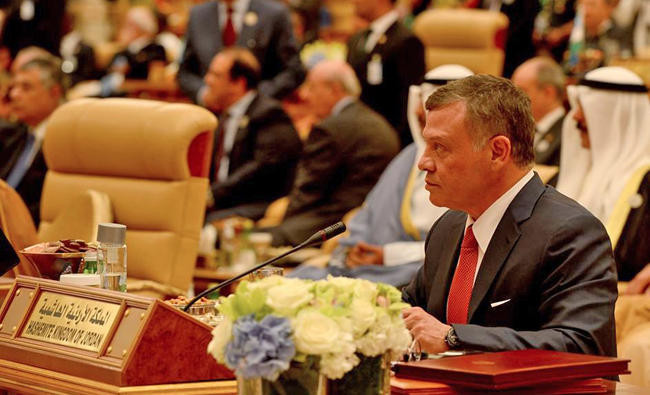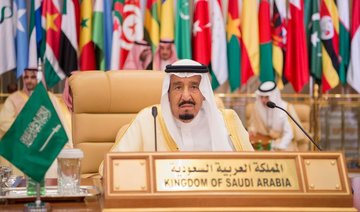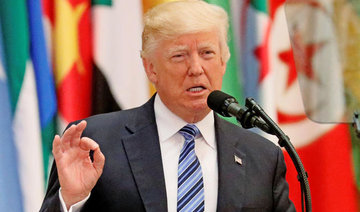In the Name of God, the Most Merciful, the Compassionate,
Prayers and peace be upon our Prophet Mohammad,
Your Majesties,
Your Highnesses,
Excellencies,
President Donald Trump,
Peace, God’s mercy and blessings be upon you.
Let me start by thanking my brother, the Custodian of the Two Holy Mosques, King Salman bin Abdulaziz, and the Kingdom of Saudi Arabia for its hospitality and graciously hosting this summit.
Mr. President,
Allow me to express my gratitude for taking this step to reach out to Muslim nations, and making it a priority on your first foreign tour as President of the United States.
We meet today to advance an effective response to the serious threats facing our world. The future for all of us will be shaped by the actions—as you pointed out—we take now, and we all have to work in partnership in four key areas. Let me say a brief word about each:
First and foremost, is the grave challenge of terrorism and extremism. Only a holistic approach can address the complex layers of the threat, from its evil ideas to its attack on prosperity and security. As you have mentioned, this demands coordinated and global action at every level.
Success requires our mutual trust as well as our strength. The fight will not be won if we do not recognise our friends as our friends and our enemies as our enemies.
Terrorist groups employ a false religious identity. Their aim is to mislead and polarise our societies and peoples. Let us state here, clearly: Terrorist groups do not inhabit the fringes of Islam—they are altogether outside of Islam; they are khawarej, outlaws of Islam. Arabs and Muslims, as you pointed out, Sir, make up the majority of their victims.
Intolerance and ignorance will only aid terror groups. It is vital to help everyone, everywhere, understand this.
Mr. President,
A second and equally vital challenge is a just and comprehensive settlement of the Palestinian cause, based on the two-state solution and the Arab Peace Initiative. This can bring an end to the Palestinian-Israeli conflict and guarantees peace for all—Israelis, Arabs, and Muslims.
No injustice has spread more bitter fruit than the absence of a Palestinian state. This is the core issue for our region, and it has driven radicalism and instability beyond our region and into the Muslim world.
The international community has a direct interest in a just peace. The Arab and Muslim world has offered its full support for effective negotiations.
And here, Sir, I would like to thank you for your determination to work towards bringing a settlement to this festering conflict. We will stand by you, Sir, in your efforts and work with you as partners.
Third, safeguarding Jerusalem must be a priority. The Holy City is a strategic linchpin, vital to relationships among the three monotheistic faiths. Attempts to create new negotiating facts on the ground will have a catastrophic impact.
All of us must engage in averting these dangers. To me personally, and to all Jordanians, the Hashemite Custodianship of Jerusalem’s Islamic and Christian Holy Sites is an unbreakable, historical responsibility, and an honour to undertake on behalf of the Arab and Muslim nations.
Mr. President,
A fourth critical task is to sharpen public focus on the values that will protect and enrich humanity’s future: mutual respect, compassion, and acceptance.
In the Muslim world, the voice of traditional, moderate Islam has been stronger in recent years. We need to continue to build on that.
Twelve years ago we were proud to inaugurate the Amman Message, which among other outcomes has been an historic, global consensus by Muslim scholars—agreeing who is a Muslim, forbidding Takfir, and explicitly recognising the validity of the eight Mathahibs of Islam.
The Three Articles of the Amman Message expose the false claims of those who would exploit religion to divide us. As Allah says in the Holy Qur'an:
In the name of God, the Most Merciful, the Compassionate,
“The believers are naught else than brothers. Therefore make peace between your brethren and observe your duty to Allah that haply ye may obtain mercy.”
[Al-Hujurat 49.10]
Mr. President,
There are nearly two billion Muslim men and women today, who enrich our world with their kindness, generosity, justice, civic family duty, and faith. Their lives express Islam’s teachings on acceptance, humility before God, compassion, and peaceful co-existence.
Our future is based on deeds, Sir, not words. We are all accountable for our commitment to fight radicalisation in all its forms.
Your Majesties,
Your Highnesses,
Excellencies,
President Donald Trump,
We must enhance our joint efforts, so that we are better able, with God’s help, to serve our peoples and future generations.
Peace, God’s mercy and blessings be upon you.































